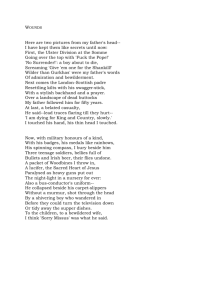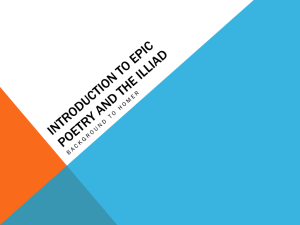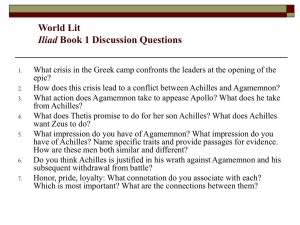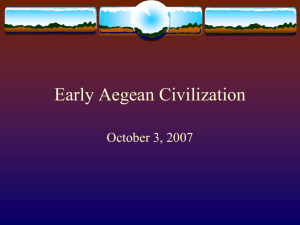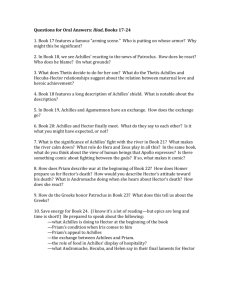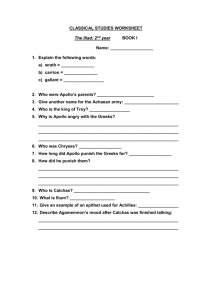Is Really Achilles a Hero?
advertisement
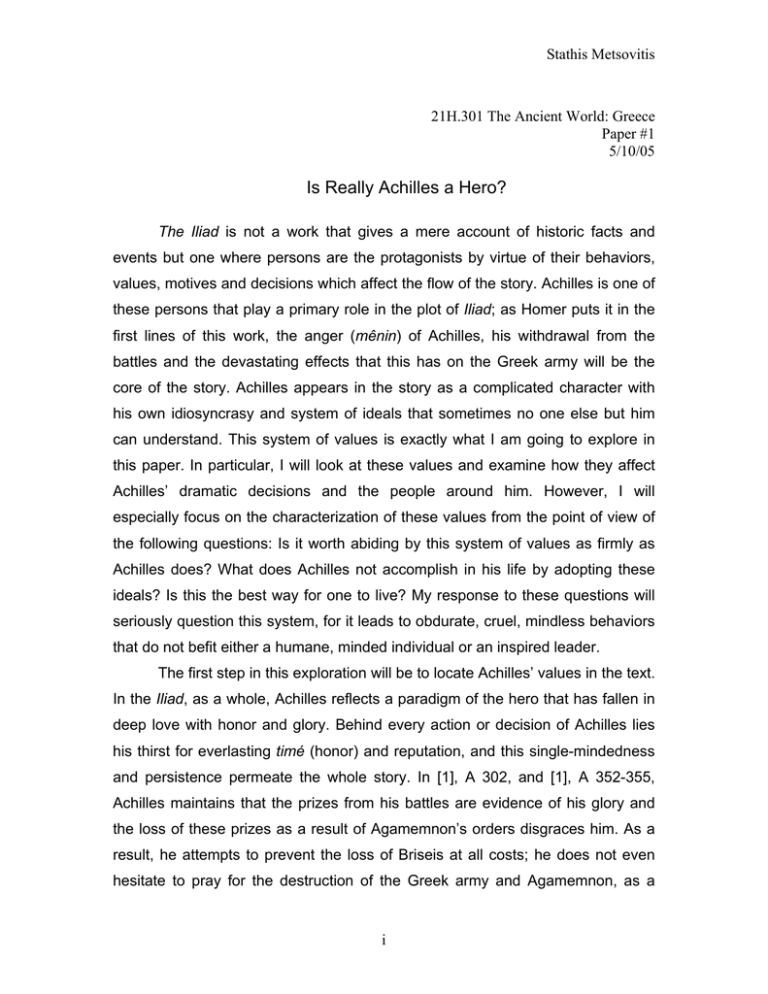
Stathis Metsovitis 21H.301 The Ancient World: Greece Paper #1 5/10/05 Is Really Achilles a Hero? The Iliad is not a work that gives a mere account of historic facts and events but one where persons are the protagonists by virtue of their behaviors, values, motives and decisions which affect the flow of the story. Achilles is one of these persons that play a primary role in the plot of Iliad; as Homer puts it in the first lines of this work, the anger (mênin) of Achilles, his withdrawal from the battles and the devastating effects that this has on the Greek army will be the core of the story. Achilles appears in the story as a complicated character with his own idiosyncrasy and system of ideals that sometimes no one else but him can understand. This system of values is exactly what I am going to explore in this paper. In particular, I will look at these values and examine how they affect Achilles’ dramatic decisions and the people around him. However, I will especially focus on the characterization of these values from the point of view of the following questions: Is it worth abiding by this system of values as firmly as Achilles does? What does Achilles not accomplish in his life by adopting these ideals? Is this the best way for one to live? My response to these questions will seriously question this system, for it leads to obdurate, cruel, mindless behaviors that do not befit either a humane, minded individual or an inspired leader. The first step in this exploration will be to locate Achilles’ values in the text. In the Iliad, as a whole, Achilles reflects a paradigm of the hero that has fallen in deep love with honor and glory. Behind every action or decision of Achilles lies his thirst for everlasting timé (honor) and reputation, and this single-mindedness and persistence permeate the whole story. In [1], A 302, and [1], A 352-355, Achilles maintains that the prizes from his battles are evidence of his glory and the loss of these prizes as a result of Agamemnon’s orders disgraces him. As a result, he attempts to prevent the loss of Briseis at all costs; he does not even hesitate to pray for the destruction of the Greek army and Agamemnon, as a i Stathis Metsovitis means of making the king understand his mistake and restore Achilles’ timé in the eyes of his fellows. The latter scene repeats in [1], I 374-409, however, here we have two more important facts. Achilles corroborates, in his response to the delegation that visited him, that the cause for his wrath is neither the loss of his wealth nor of Briseis, but the deprivation of his rightful spoils. In his mind, this action degrades his achievements in combat and harms his prestige; this prestige is exactly what Achilles pursues in his life and he seems to lose it as an effect of Agamemnon’s behavior. Also, the acceptance of Agamemnon’s gifts to return to the battlefield may make him wealthier, but result in a greater loss of honor, therefore he rejects them. A few lines later, [1], I 398-402, Achilles becomes even more emphatic: he stresses that the motive for his participation in the Trojan War is not the love for wealth, since his father Peleus was rich enough, but his hunt for glory and pride, which would distinguish him from all others. In [1], I 415 he ends up saying that a life without timé is pointless and in [1], I 647-648 he proclaims to Aias that Agamemnon humiliated him. On the same note, on hearing about the demise of his intimate friend Patroclus, in [1], Σ 112-117, he defies death and swears to take revenge for the loss of Patroclus, because he believes that in this way he will receive even more glory. Nevertheless, glory and honor for a Mycenaean man are not only achieved in the battle field. Nobility, sincerity, politeness and respect to gods, his parents and other men are also important for Mycenaeans and Achilles exhibits these qualities in every occasion. He shows respect and modesty before the gods by obeying their orders even if they are contrary to his will; for instance in [1], A 215-218 the intervention of Athena prevents Achilles from assassinating Agamemnon and in [1], Ω 139-141 he agrees to stop the desecration of Hector’s body after the exhortation of his mother, goddess Thetis. Additionally, he manifests his love and devotion to his comrades in [1], I 323 and he talks courageously and sincerely, expressing clearly his opinions, as is seen in [1], A 149-171 and in [1], I 309. However, what we see in book Ω is much more critical when trying to identify Achilles’ code of values. In the beginning of this book Achilles exhibits an ii Stathis Metsovitis atrocious and vindictive behavior, which contradicts the traits of an ancient hero as they were described above, by desecrating dead Hector. Everything seems to change though, when Priam, the father of dead Hector, comes to Achilles with gifts, entreating for his dead son’s corpse. Achilles, after a divine intervention, softens his anger and not only accepts the offer but also welcomes Priam warmly, according to all the institutions of xènia. This entirely different second face of Achilles showing measured humanity should not be surpsiring; Achilles has now an excellent opportunity to recover his heroic virtues. By giving back the corpse of Hector to Priam, he shows nobility and respect to the elderly and the foreign leader. Moreover, by having the foreign king visit and entreat him with gifts, Achilles feels that he is still important and respectful in the eyes of others. This visit breaks Achilles’ long isolation and restores some of his lost kleos (glory), and this explains his acceptance of the offer. This is essentialy the same role that Achilles plays in book Ψ, where as a preeminent social leader and umpire, organizes funeral games in remembrance of Patroclus. Having mentioned the values that Achilles exhibits in the Iliad, I am now going to examine more closely the effects they have on the people around him, both Greeks and Trojans. The analysis here is essential, for it will help us understand how things would be different if Achilles was more humane and less rigid earlier in the story. According to Homer’s narration in the beginning of the Iliad ([1], A 10-12), Greeks have already suffered much by the god-driven plague caused by the abduction of Chryseis, the daughter of the god-loved priest Chryses. As we see in [1], A 303-310, Agamemnon finally agrees to give Chryseis back to her father, but just as Greeks were expecting a better day to come in their camp, two evils hit them. The first is Achilles’ subsequent withdrawal from the battlefield, which emboldens Trojans and discourages Greek soldiers, since they now fight without one of their best warriors. However, even worse is a second god-driven plague, caused by Achilles’ prayers. The illtempered Achilles is once more not thinking as a “community man” but rather on his own. Living in his single-mindedness, he is only determined to achieve his iii Stathis Metsovitis personal goals, namely unlimited kleos, being indifferent to the outcome and the effects on others. In addition, Patroclus’ demise and Achilles’ subsequent decision to join the Greek army again can be regarded as a consequence of Achilles’ compliance with a problematic system of values. It is because of his complex that Achilles does not enter the war himself. Instead, he sends his loyal companion to the battlefield, indirectly contributing to his death. Patroclus’s death stimulates Achilles to reconsider his attitude towards his comrades. On the one hand, he feels remorse and embarrassment for not going to the battlefield himself and having sent Patroclus instead. On the other hand, his thirst for glory is unquenchable. Nothing else but this thirst is what makes him terminate the estrangement from his fellow Greeks. According to Achilles’ moral code, if he manages to kill Hector and take revenge for Patroclus’ loss he will be honored. Therefore an outraged Achilles makes the big decision to join his comrades and take revenge for his friend’s death. He fights with bitter hatred and kills Hector, thus giving courage to Greeks and spreading sorrow in Troy. At this stage however, the mutilation of Hector’s corpse dehumanizes Achilles’ morals. Achilles abandons the noble qualities of a social hero and becomes disrespectful, a man without feelings. It is only because of the Gods’ intervention that he stops. Having analyzed the ideals and the motives of Achilles as well as their consequences in the evolution of the story, we are able now to focus on the major questions that were raised at the start of this paper. Achilles remains throughout the Iliad faithful to the system of values which was described above. By adhering to it he may obtain what every Mycenaean parent wishes for his son, through the inherited code of ideals, namely timé and kléos. Nonetheless, we should be wondering whether this blind adherence goes to extremes and whether there are also other equally important things that an ancient Greek male aristocrat should seek in his life [3]. Achilles is a supernatural warrior who seems to have been isolated from his social environment. Before his own eyes, his actions seem heroic, but meanwhile few of his fellows understand them; thus Achilles cannot be considered as a community man. More precisely, these iv Stathis Metsovitis actions are not balanced on the basis of their consequences on society, but on his personal code of values, which is excessively rigid, focused on how to become first and distinguish oneself from others. It is not astonishing therefore that Achilles seems to ignore the happiness of everyday life and the heroism one can show in his daily routine. Indisputably Achilles’ life is a heroic life, with the narrow Mycenaean meaning of the term, but it is very doubtful whether it is also a happy life, since Achilles is tightly engaged in his personal conflicts and peculiar ideology. The incidence that gives valuable insight in Achilles’ attitude towards life is the delivery of his new shield by his mother Thetis ([1], T 13-28). Achilles gazes it frivolously, merely as a nice piece of warfare equipment, and totally ignores the import behind the impressive engravings. This elaborate shield mostly depicts scenes of the everyday life of a peaceful polis (city) and its residents ([1], Σ 490~); scenes full of joy illustrating young people dancing and participating in rich banquets; in other instances people are resolving their differences peacefully in law-courts, despite their passions and anger. There are also scenes with ordinary, though admirable, people working on the fields, struggling honorably for their living without killing others in battles and looting their properties. In spite of the fact that the struggle of people in their workplaces bears disappointments since their efforts are not always rewarded, people continue, in a heroic context, their efforts to render their lives more comfortable ([1], Σ 573-587). People of a peaceful polis exhibit an everyday modest heroism and admirable dignity in their efforts to overcome the obstacles in their work and relations, in order to build up a healthy, self-sufficient and harmonic community with their peers. It is exactly this kind of humane heroism that Achilles does neither possess nor appreciate. Because not only in war but also in daily life, are there positions of honor, prizes and rewards that make an individual stand out from the others. Public recognition and rewards can also be regarded as fruits of hard work, social responsibility, proper treatment of fellow citizens, wisdom and eloquence. Not only is there the paradigm of Nestor, the anax (king) of Pylos, in the Iliad, who is admired for showing all these qualities but also the scene of the law-court ([1], Σ 497-508) v Stathis Metsovitis that makes this clear. On the one hand, the jury of this law-court consists of respectful seniors who have excelled both in battle and city life, having thus obtained the privilege to distribute justice. On the other hand, the litigant parties provide arguments in order to convince the jury about their right. The winning party will obtain wealth but more importantly he will obtain more honor and appreciation from his peers. On the contrary, the polis in war, as depicted on the shield, is a heartbreaking scene which is little described by Homer. This picture illustrates to a great extent the life Achilles has chosen to live. Therefore, Achilles neglects the peaceful life his shield puts forward and instead he picks up his weapons and rushes into the battle ready to redeem himself by killing Hector. Much in contrast with the hectic and violent life of Achilles comes the somewhat measured life of Hector. While being a hero in the battlefield, Hector is also a domestic and communal figure, thus deserving additional respect. In book Z we see Hector being a tender father and husband, not hesitating to express his human feelings and trying to provide reasons for his decisions to Andromache. On the contrary, Achilles is isolated from his peers and only the presence of Patroclus keeps him socially alive. In his life there are absolutely no scenes like the ones that Hector experiences. Social responsibility, affection and love are absent from Achilles’ life. Even in the case of Briseis, it is evident that he sees her more as a prize of war than as a wife. Moreover, he feels no need to justify his decisions to anyone because these are made only on the basis of his set of values. As a result, Achilles may be admirable for his battle achievements but he is still incomprehensible by his peers. From another point of view, many things would be different if Achilles were not so idiosyncratic, both for him and his peers. Sacrificing his own goal for more and more pride and yielding to the common good would render him even more admirable in the future and of course would have preempted the additional pain Greeks suffered because of his decisions. Then Achilles would not only be a hero for himself but also a societal hero, forming an integrated paradigm of heroism both in the battlefield and community. Moreover, should he have adopted a more approachable, less honor-obsessed, humane and modest vi Stathis Metsovitis attitude of living, he would be able to resolve his inner conflicts which prevented him from living a happy life. In addition, he could have prevented the loss of his best friend Patroclus, which can be attributed in some sense to his withdrawal from the Greek army. It is worth noticing how humane Achilles becomes after talking with Priam in his tent ([1], Ω 500~), when he seems to realize how bad human pain is and that there are other noble qualities that one must possess to be a hero in the whole meaning of the term. In conclusion, Achilles’ hunting of excessive honor and glory deprive him of living a balanced life. Achilles’ may be admired for his boldness in battle, but on the other hand he has little to show in his social and family life, since he’s little concerned about the effects of his actions on others. He is overly hot-tempered and addicted to his code of values, which does not allow him to pursue any other goals which ought to characterize the life of a human being. This obsession sometimes demoralizes Achilles and makes him even ferocious. Therefore, the system of ideals that Achilles has chosen to follow, let alone his way of adhering to it, should be rejected. References [1] Homer, The Iliad, (in Greek), Translation by N. Kazantzakis. (High School Textbook), Athens, 1998 [2] Homer, The Iliad, (in English), ed. Samuel Butler. http://www.perseus.tufts.edu/cgi-bin/ptext?doc=Perseus%3Atext%3A1999.01.0217 (Oct. 2, 2004) [3] Prof. Steven Ostrow, Personal Communication, Sept. 30, 2004 vii
